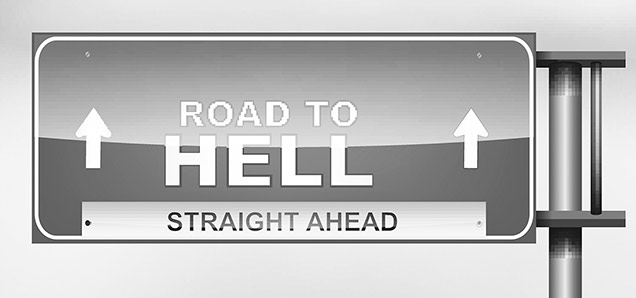Notes From Day Seven: Wendell Berry: Welcome to Hell?
 CREDIT: THINKSTOCK
CREDIT: THINKSTOCKOur appetite to consume is taking our world places we don�t want to go.
On most mornings of most weeks I consume more energy than the grandfather after whom I am named probably used in a lifetime. Powered by highly refined petroleum, a one-tonne vehicle carries me 30 kilometers to one of my offices. The most energy-consuming “machine” my grandfather ever guided was a horse. This is an illustration of how much our economy has changed in one short century. And it is an indicator that our planet — and we along with it — is in great danger.
In last week's column I mentioned some of the dangers of an economy that depends on oil and is dominated more and more by corporations whose success is disconnected from the well-being of communities, families, local environments, and urban landscapes.
I said that I would look at some of the thought of theologian and farmer, Wendell Berry. I believe his thinking is very important as we face a time in the history of our planet that appears ready to give way to catastrophic change brought on by our enjoyment of an oil-based and energy-greedy economy.
Berry, in an essay titled, “Faustian Economics: Hell hath no limits” (published by Harpers in May 2008) identifies our love of the notion of limitlessness. In an act of blind faith, we believe that science and technology provide us with a limitless future of enjoyments. At the same time this religion holds that the twin pair will resolve our energy and environmental problems. Even as the time before we reach the cliff edge has now become alarmingly short.
We are, writes Berry, like Doctor Faustus. He is the fictional character who in the play, The Tragical History of Doctor Faustus by Christopher Marlowe, desires above all to “possess” all the treasures of Nature and to search the whole world for knowledge and power.
I can't help but think of the infinity of Facebook postings we see every day from Punta Cana, St. Lucia, Orlando, and a thousand other places as we and our friends enjoy sun destinations every winter, soaking up the treasures of nature, searching the world for more and more.
Berry shockingly alludes that we are creating hell on earth. As Mephistopheles, a devil, says in Faustus, hell hath no limits. Hell is where we pretend to live without limits, taking everything we desire. (I am not suggesting that this is the final definition of hell, only that where we assume to live without limits we bring it on.)
What does Wendell propose as a solution? He attempts to have the reader embrace the notion of limits. We cannot have everything we desire. And if we do, we will burn up our planetary home. Wendell proposes that we recall that we are created beings, human beings made by the Creator. He is without limit; we are not (and neither are devils: they are deluded on this score).
Realizing our “creatureliness” is key to becoming free of our self-constructed hell on earth. As created beings we depend on healthy connections with our finite but rich planet and the human society, which God has created for our thriving. Our true (economic) wealth as a human race does not come from corporations or social networking. It comes from the land, the air and oceans. When our manufacturing and consumption destroy our environments, we destroy our wealth.
Consider this obvious example. When our national economy demands the destruction of thousands of square kilometres of Alberta's topography for the sake of shortterm “economic” growth of the country through oil sales, we have caved in to a distorted and destructive understanding of our true economy. For the short term we'll all be able to drive SUVs. But for the long term, we'll collude with a global economy whose outcome should alarm us greatly.
We need to become aware again of the connections without which we will not survive: connections to our lands, the water, the air, connections to the production of our food, to the animals on whose well-being ours also depends, to the families and parents from whom we are born, and to our local and national communities.
As his essay concludes, Wendell asks that we look to artists for inspiration. Artists, he says, work within limits to produce pieces that nourish us. A poet must arrange words according to very strict rules; otherwise her work will not be read. A painter must work within the limits of the possibilities of line, colour, texture, shape and the size of canvas or area to be painted.
No artist will succeed if his art results in the destruction of the sources of pigment or the burning of all poetry and music of the past. And yet, in our desire for limitless living, aren't we about to destroy the canvas on which we live, the colours that give delight, and the harmonies that inspire and feed us?
Editorial opinions or comments expressed in this online edition of Interrobang newspaper reflect the views of the writer and are not those of the Interrobang or the Fanshawe Student Union. The Interrobang is published weekly by the Fanshawe Student Union at 1001 Fanshawe College Blvd., P.O. Box 7005, London, Ontario, N5Y 5R6 and distributed through the Fanshawe College community. Letters to the editor are welcome. All letters are subject to editing and should be emailed. All letters must be accompanied by contact information. Letters can also be submitted online by clicking here.













